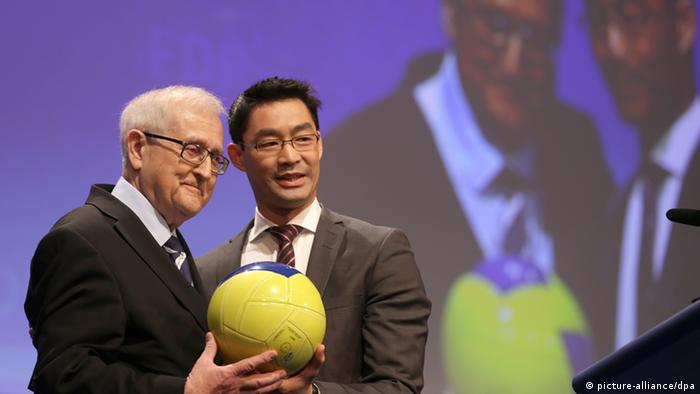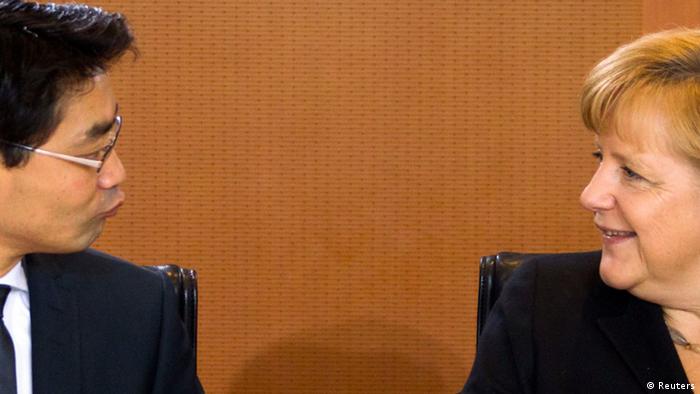At their pre-election congress, Chancellor Merkel's junior partners are seeking to consolidate their comeback from the depths of voter distrust. They risk being voted out of parliament in September's elections.
Two party congresses within eight weeks - the German Free Democratic Party (FDP) members have obviously a lot to talk about. After convening a delegates' assembly to settle the power struggle between the 40-year old party chief, Philipp Rösler, and his many factional adversaries, the pro-business party will hold a congress in the southern city of Nuremberg on Saturday and Sunday.
Just a couple of weeks ago, it seemed that Rösler's days as party chairman were numbered, as poll ratings sank as low as 2 percent in some surveys. Rösler, also Germany's Economy Minister, was able to hang on to his position in the party after pulling off an unexpectedly strong state election result of 9.9 percent in Lower Saxony in January. However, one of his fiercest critics, the head of the FDP faction in parliament, Rainer Brüderle, was made the party's top candidate in the upcoming national elections on September 22.
'Keeping Germany on track'
But there is a difference between demonstrating self-confidence and presenting facts and figures. Recent polls show the Free Democrats consistently hovering around the five percent threshold for winning seats in the Bundestag, the lower house of parliament.
The low approval ratings were at the center of the leadership debate that started last winter. Some regard the fact of the FDP simply managing to get into parliament as a success, although, officially, nobody would ever admit this openly. The party's declared goal remains the continuation of the coalition with Chancellor Angela Merkel's conservative Christian Democrats (CDU).
However, polls suggest that Merkel's centre-right coalition would fall short of a majority in the upcoming September election. Nevertheless, the FDP remain optimistic: Just a few days ahead of the congress in Nuremberg, the party's executive committee adopted a resolution pledging to "keep Germany on track, reduce the tax burden, consolidate the budget and promote growth".
Just a couple of weeks ago, it seemed that Rösler's days as party chairman were numbered, as poll ratings sank as low as 2 percent in some surveys. Rösler, also Germany's Economy Minister, was able to hang on to his position in the party after pulling off an unexpectedly strong state election result of 9.9 percent in Lower Saxony in January. However, one of his fiercest critics, the head of the FDP faction in parliament, Rainer Brüderle, was made the party's top candidate in the upcoming national elections on September 22.
'Keeping Germany on track'
But there is a difference between demonstrating self-confidence and presenting facts and figures. Recent polls show the Free Democrats consistently hovering around the five percent threshold for winning seats in the Bundestag, the lower house of parliament.
The low approval ratings were at the center of the leadership debate that started last winter. Some regard the fact of the FDP simply managing to get into parliament as a success, although, officially, nobody would ever admit this openly. The party's declared goal remains the continuation of the coalition with Chancellor Angela Merkel's conservative Christian Democrats (CDU).
However, polls suggest that Merkel's centre-right coalition would fall short of a majority in the upcoming September election. Nevertheless, the FDP remain optimistic: Just a few days ahead of the congress in Nuremberg, the party's executive committee adopted a resolution pledging to "keep Germany on track, reduce the tax burden, consolidate the budget and promote growth".
'Germans are doing well'
Germany is on the right track, says the resolution: "While many countries in Europe are still struggling with the aftermath of the debt crisis, we are doing well." According to the Free Democrats, Germans owe their prosperity to the ruling CDU-FDP coalition. Top candidate Brüderle claims that by raising child benefits and lowering contributions to the pension scheme, the German government has reduced the financial burden on citizens by a total of 22 billion euros.
The Free Democrats believe September's national elections will decide on the future course of the country. The FDP doesn't only stand out for its fiscal policy, says FDP General Secretary Patrick Döring. A confidante of Rösler, he says the Liberals also campaign for equal rights for same-sex couples, budget consolidation without debt, modern immigration laws that enable dual citizenship and no tax hikes. "These are our answers to a changing society," says Döring.
The FDP is the preferred partner of Angela Merkel's party since the Free Democrats, the Christian Democrats and their Bavarian sister party, the Christian Social Union (CSU), have most in common in terms of fiscal and economic policy.
Men call the shots
An agreement has even been reached with German Finance Minister Wolfgang Schäuble (CDU) on balancing out the budget by 2014. However, the parties still disagree on issues such as gay marriage and minimum wage. dw de



No comments:
Post a Comment